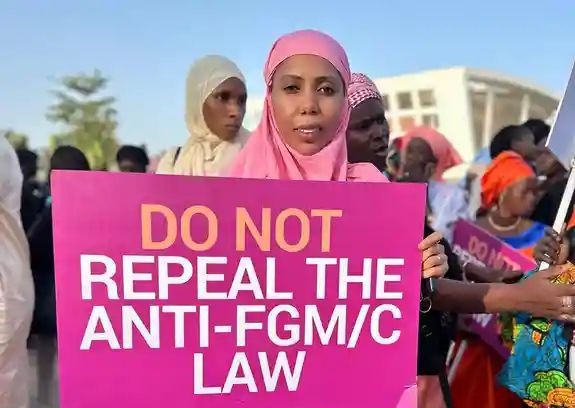By: Dawda Baldeh
The debate on the ban and repeal of Female Genital Mutilation (FGM) has reached an intensive stage. Yesterday, women’s rights activists called on the National Assembly Members (NAMs) to reinforce the ban on the practice of FGM, stating that repealing it would mean putting girls and women at greater risk.
The activists, led by Jaha Dukureh, the founder of Safe Hands for Girls, and Jainaba T. Sarr, the Country Representative for Future in Our Hands, were the last to appear before the National Assembly Select Committee on Health and Gender to present their position paper and express their stance on FGM.
Speaking to the NAMs, Jaha Dukureh, an ardent fighter against FGM, shared her personal experience after undergoing the practice and called on lawmakers to reinforce the ban. “Repealing the ban on FGM means putting girls and women at greater risk. So, I urge you to maintain the law and save the future of girls from undergoing this harmful practice,” she pleaded.
The activists, accompanied by civil rights groups, survivors, and anti-FGM campaigners, highlighted the detrimental impact the practice has had on many women and girls globally. “FGM has no health benefits and is very harmful,” explained Jainaba T. Sarr, the Country Representative for Future in Our Hands.
Despite the ban being in place for nine years, the practice continues in some parts of the country, with only three convictions made so far in August last year.
The activists reminded lawmakers of their duty to safeguard the future of girls and women by ensuring laws to protect their rights. “What more evidence do people need to understand that FGM is harmful? There are videos, life testimonies of survivors, and data,” Activist Dukureh questioned.
The presentation of a position paper on FGM by the Anti-FGM campaigners was part of ongoing public and stakeholders’ consultations regarding the proposed bill to repeal the ban on FGM. The National Assembly Select Committee on Health and Gender is tasked with gathering information on the matter and reporting back to parliament to enable lawmakers to make informed decisions on behalf of Gambians regarding whether the ban will be repealed or reinforced.
According to the World Health Organization, more than 230 million women and girls alive today have undergone FGM in 30 countries in Africa, the Middle East, and Asia.




